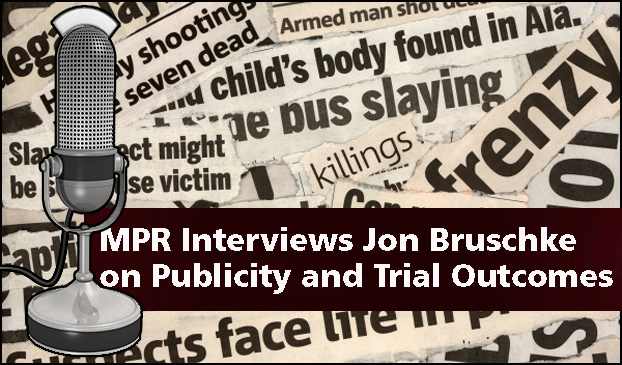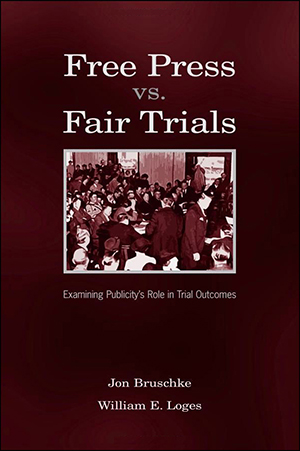
Radio Clip Transcript:
Bruschke on Publicity and Jury Trials
MPR Interview Prompted by Loughner Charges in Tucson Case
While it is likely a matter of many months or longer until Arizona shooting suspect Jared Lee Loughner, charged with the Jan. 8 Tucson shooting that killed six people, including Chief U.S. District Court Judge John Roll, and left 14 others injured, including U.S. Representative Gabrielle Giffords, media coverage of the incident and its aftermath continues unabated.
Last week, on Jan. 24, Minnesota Public Radio's Kerri Miller, a veteran newspaper and radio reporter and host of MPR’s show, Midmorning, interviewed Cal State Fullerton’s Jon Bruschke, on the impact of pretrial media coverage and publicity on jury trial outcomes.
His interview can be heard about three-fourths of the way through the second hour of the show podcast (at 44 minutes, 30 seconds into the segment for that day, which is available for listening at Minnesota Public Radio's podcast archive).
Kerri Miller: Arizona shooting suspect Jared Lee Loughner will appear in a Phoenix courtroom at 2:30 p.m. Minnesota time. He will be arraigned on federal charges. He’s expected to enter a plea. Authorities say the case could take years to make its way through the court system, but among the earliest decisions: whether Loughner is mentally competent enough to stand trial and where that trial will be held.
We’ve asked Jon Bruschke, co-author of “Free Press vs. Fair Trials: Examining Publicity's Role in Trial Outcomes,” to give us some perspective. Bruschke is professor of human communication studies at California State University, Fullerton. Professor, it’s good to have you with us.
Jon Bruschke: It’s good to be here.
Is it possible to hold a trial, and I know they're going to do it, potentially, in this country, where the jurors have not heard so much information as to be influenced about the outcome of a case like this?
Well, it's a big country. There are a lot of us here. Could you find 12 people who could be fair jurors? I think that's possible, and more than that, I think that what the research clearly shows is the jurors will base their decision on the evidence as much as they can and probably not on things they've heard in the media three or four years before.
Do they say that, or do they do that?
The research shows that they actually do that. One consistent finding is there’s almost always a pro-defendant shift once the deliberations start. A truly innocent defendant who really has all the evidence out there can get a fair trial.
I want to emphasize what you just said. There is a pro-defendant shift once the deliberations in the jury room begin?
I think that the jurors do take the question of reasonable doubt seriously, and when they start talking about, ‘OK, do we have reasonable doubt,’ they start by listing what they are uncertain about.
The evidence tends, I believe, to get a little less compelling the longer you think about it. You can usually find questions, reasonable questions, to ask almost all the time.
It looks like federal prosecutors are trying to bring the hearings back to Tucson. But is it to be expected that there will be a motion to move the trial, if there is one, and whenever it is, out of Tucson?
I would be surprised if they didn’t move it. If you believe that there is ever a time that it’s appropriate to move the venue, it’s surely a case of this stature.
Again, because of all the publicity?
Yeah. The Supreme Court, famously, in the Sheppard case, said there can be a time where a defendant’s fair trial is compromised by too much publicity. And if you think there’s ever a case where that would happen, surely it’s the one that is on the front page of every paper for months.
So you’ve written a book examining publicity’s role in trial outcomes. What do we know about how the pretrial publicity affects the outcome of the trial?
Well, most of what we know is based on experimental studies, and the purpose of our book was to look at that and then say, well, can we replicate the findings of laboratory studies and field research?
Most of the lab research does show that there is a pretrial publicity bias, and our conclusion is that that generally does not replicate in actual trials.
I think that’s surprising.
Well, it is. The two things that you probably don't know about the criminal justice system if you’re not already a lawyer are that 80 to 90 percent of people plead guilty, and of the cases that go to trial, 80 to 90 percent of those outcomes are guilty.
So you start with only about a four percent chance of winning if you’re a criminal defendant, and most of them don’t have very good representation. Most of them can’t conduct an independent investigation to get evidence out there. It's not really like it is on “CSI,” where there are dedicated people getting small microfibers of evidence.
If you’re a criminal defendant and your case is publicized, you’re probably going to get more attention from your public defender. You've got one resource that most people don't have.
I was going to say the case with this, we’re hearing that the lawyer that’s been brought in from San Diego is very, very experienced in these cases. Of course, there will be a lot of investigatory resources, because if there is a trial they’ll want to make sure that it’s fair. How does that get affected, though, by we now hear two dozen videos of what happened, the evidence that Jared Lee Loughner left behind. How does that affect that, do you think?
What jurors really want to do is come up with the right decision, and I do believe it’s true that they don’t discriminate too much if the best evidence they hear or they heard is in a newspaper instead of at the trial.
But in this case, it just does not seem possible that the amount of admissible evidence would lead to any other conclusion than that he was the shooter. I don't even think that's going to be a question.
So the question, I think, will come down to mental capacity, and that is such a difficult defense to win, anyway.
I wonder if public opinion influences that question of mental capacity or the outcome. Have you looked at that?
Well, you would think it would. It just doesn’t, in my opinion. One of the very first articles that I ever did was to look up all of the abuse-excuse, repressed-memory, Twinkie defenses.
You can find them, but they win so rarely. I don’t think that you could say that any one factor, and certainly not public opinion, was dictating the outcome of those cases.
What do we know about how publicity has affected some of the other very high-profile cases? I’m thinking O.J. Simpson. Elizabeth Smart’s case just was adjudicated in Utah. What do we know?
Well, I should say what we do is to look at a broad range of cases, not the individual ones. But if the criminal conviction rates are 80 to 90 percent, think of the cases you just listed and then how many of those ended up in acquittals.
The Menendez brothers got a hung jury. They got a second trial. O.J. Simpson got acquitted. The LAPD officers in the Rodney King case were acquitted. If you list the high-profile cases, you find far more acquittals than you would find in the overall population of criminal cases, which is the opposite of what you’d expect if pretrial publicity was indeed creating a huge bias against defendants.
I mean, how could O.J. Simpson ever possibly have been acquitted if pretrial publicity influenced the opinion of the jurors?
That’s actually a good point. We should also say that this case will take a very, very long time to wind through the system, won’t it?
Yes. That’s an important factor. You’re probably more attuned to news sources than just about any of us. Could you yourself say that you remember what you read in the newspaper three years ago?
It depends on what it is.
It probably does. But three or four years — human memory is just not good enough that you could remember everything that you read. You probably have a couple ideas that you can recollect.
But the evidence that you hear at the trial will have much more depth than anything you read in the newspaper. It will have much more currency for you and much more detail.
That’s right.
I just think that the evidence presented at the trial ends up being much more important to the outcome of the case than the newspaper stories.
Again, you’re saying that argues for a fair trial.
Yeah, and an important thing to know is the longest delay any research has ever studied is two weeks, and as you said, this case is surely not going to trial for years.
So even if we did know on all of our laboratory studies on undergraduates that within two weeks they can still remember it, I don’t know that we know too much about how well jurors remember stuff two or three years later.
Professor, I really appreciate the insight. I hope you’ll come back and we can talk further. Thank you.
My pleasure. Thanks for having me.
Jon Bruschke is a professor of human communication studies at California State Fullerton. He is co-author of “Free Press vs. Fair Trials: Examining Publicity’s Role in Trial Outcomes.”
Feb. 2, 2011

